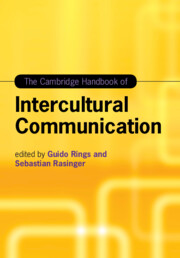Book contents
- The Cambridge Handbook of Intercultural Communication
- Cambridge Handbooks in Language and Linguistics
- The Cambridge Handbook of Intercultural Communication
- Copyright page
- Contents
- Figures
- Tables
- Contributors
- Acknowledgements
- Introduction
- Part I Introducing Intercultural Communication
- Part II Theoretical Approaches
- Part III Methods
- 12 Decolonizing Gender and Intercultural Communication in Transnational Contexts
- 13 Migration in the Digital Social Mediasphere
- 14 Linguistic Politeness
- 15 Contemporary Literature and Intercultural Understanding
- 16 Enhancing Intercultural Skills through Storytelling
- 17 Cinema as Intercultural Communication
- 18 Intercultural Memory and Violence in Jewish Literature
- 19 Intercultural Communication in Social Work Practice
- 20 Intercultural Education in Study Abroad Contexts
- 21 Intercultural Communication in the Courtroom
- Part IV Application
- Part V Assessment
- Index
- References
21 - Intercultural Communication in the Courtroom
The Doctrine of Public Policy
from Part III - Methods
Published online by Cambridge University Press: 18 February 2020
- The Cambridge Handbook of Intercultural Communication
- Cambridge Handbooks in Language and Linguistics
- The Cambridge Handbook of Intercultural Communication
- Copyright page
- Contents
- Figures
- Tables
- Contributors
- Acknowledgements
- Introduction
- Part I Introducing Intercultural Communication
- Part II Theoretical Approaches
- Part III Methods
- 12 Decolonizing Gender and Intercultural Communication in Transnational Contexts
- 13 Migration in the Digital Social Mediasphere
- 14 Linguistic Politeness
- 15 Contemporary Literature and Intercultural Understanding
- 16 Enhancing Intercultural Skills through Storytelling
- 17 Cinema as Intercultural Communication
- 18 Intercultural Memory and Violence in Jewish Literature
- 19 Intercultural Communication in Social Work Practice
- 20 Intercultural Education in Study Abroad Contexts
- 21 Intercultural Communication in the Courtroom
- Part IV Application
- Part V Assessment
- Index
- References
Summary
Bertil Cottier’s chapter explores the doctrine of ordre public, which allows judges to block the ‘import’ of unacceptable foreign customs and traditions and which has received significant attention in the context of enhanced international relations at the personal and social level, including interethnic marriages and mass immigration. The ordre public doctrine is examined in respect of issues pertaining to family law and succession law, two domains where its impact is most significant since marriage, divorce, filiation and inheritance are deeply rooted in social and religious values. Special attention is paid to the clash, generated by increasing immigration from Muslim countries, between Islamic legal institutions such as polygamy and repudiation and Western principles of equality and non-discrimination.
Keywords
- Type
- Chapter
- Information
- The Cambridge Handbook of Intercultural Communication , pp. 350 - 364Publisher: Cambridge University PressPrint publication year: 2020



